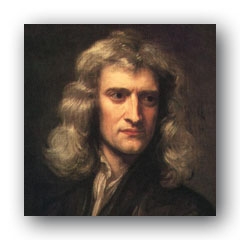Newton
The European Dream Of Progress And Enlightenment
Source: H. S. Thayer and John H. Randall, eds., Newton's Philosophy of Nature
(New York: Hafner Publishing Co., 1953), pp. 3-5.
Date: 1992
Document: Newton, Rule III Of Reasoning

This selection, from Book III of the Principia, illustrates Newton's
conception of universal gravity.
RULE III
The qualities of bodies, which admit neither intensification nor
remission of degrees, and which are found to belong to all bodies
within the reach of our experiments, are to be esteemed the
universal qualities of all bodies whatsoever.
For since the qualities of bodies are only known to us by
experiments, we are to hold for universal all such as universally agree
with experiments, and such as are not liable to diminution can never be
quite taken away. We are certainly not to relinquish the evidence of
experiments for the sake of dreams and vain fictions of our own
devising; nor are we to recede from the analogy of Nature, which is wont
to be simple and always consonant to itself. We in no other way know the
extension of bodies than by our senses, nor do these reach it in all
bodies; but because we perceive extension in all that are sensible,
therefore we ascribe it universally to all others also. That abundance
of bodies are hard we learn by experience; and because the hardness of
the whole arises from the hardness of the parts, we therefore justly
infer the hardness of the undivided particles, not only of the bodies we
feel, but of all others. That all bodies are impenetrable, we gather not
from reason, but from sensation. The bodies which we handle we find
impenetrable, and thence conclude impenetrability to be a universal
property of all bodies whatsoever. That all bodies are movable and
endowed with certain powers (which we call the inertia) of persevering
in their motion, or in their rest, we only infer from the like
properties observed in the bodies which we have seen. The extension,
hardness, impenetrability, mobility, and inertia of the whole result
from the extension, hardness, impenetrability, mobility and inertia of
the parts; and hence we conclude the least particles of all bodies to be
also all extended, and hard and impenetrable, and movable, and endowed
with their proper inertia. And this is the foundation of all philosophy.
Moreover, that the divided but contiguous particles of bodies may be
separated from one another is a matter of observation; and, in the
particles that remain undivided, our minds are able to distinguish yet
lesser parts, as is mathematically demonstrated. But whether the parts
so distinguished and not yet divided may, by the powers of Nature, be
actually divided and separated from one another we cannot certainly
determine. Yet had we the proof of but one experiment that any undivided
particle, in breaking a hard and solid body, suffered a division, we
might by virtue of this rule conclude that the undivided as well as the
divided particles may be divided and actually separated to infinity.
Lastly, if it universally appears, by experiments and astronomical
observations, that all bodies about the earth gravitate toward the
earth, and that in proportion to the quantity of matter which they
severally contain; that the moon likewise, according to the quantity of
its matter, gravitates toward the earth; that, on the other hand, our
sea gravitates toward the moon; and all the planets one toward another;
and the comets in like manner toward the sun: we must, in consequence
of this rule, universally allow that all bodies whatsoever are endowed
with a principle of mutual gravitation. For the argument from the
appearances concludes with more force for the universal gravitation of
all bodies than for their impenetrability, of which, among those in the
celestial regions, we have no experiments nor any manner of observation.
Not that I affirm gravity to be essential to bodies; by their vis insita
I mean nothing but their inertia. This is immutable. Their gravity is
diminished as they recede from the earth.
Source: H. S. Thayer and John H. Randall, eds., Newton's Philosophy of Nature
(New York: Hafner Publishing Co., 1953), pp. 3-5.

